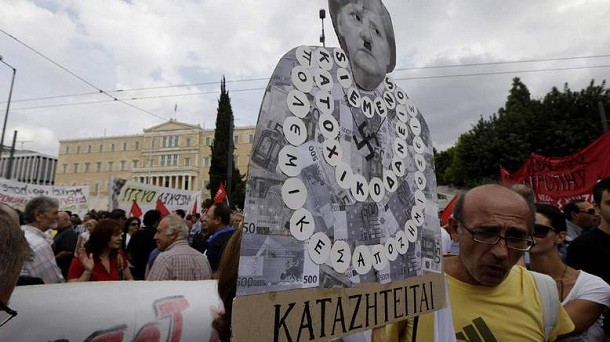On Sunday, Prime Minister Alexis Tsipras touched on war reparations issue as well as the forced 1942 loan taken by Nazi forces from an occupied Greece.
“Its about a moral obligation to history and to all those that fought against fascism and died doing so,” he said on Sunday, adding that the wartime loan and other reparations would be sought by a committee with war hero Manolis Glezos at the helm.
The size of German reparations
Greek is not asking Germany to pay for the deaths of some 300,000 people as well as Greek 60,000 Jews (three quarters of the country’s Jewish population). Nor is Athens calling for payment of the plundered goods that left hundreds of thousands of citizens destitute and starving while also forcing exports that led to hyper-inflation.
Instead, the Greek government is asking for the repayment of a “loan” that the Nazis, who occupied Greece for four years, forced the central bank to handover to the Third Reich. The amount at the time was 476 million reichsmarks interest-free on March 14, 1942. This loan was responsible for the financial ruin of the already Nazi-plundered country. The amount is valued at 162 bln euros today, more than half the Greek debt, according to SYRIZA. “Guesstimates” by Albert Ritschle, professor of economic history at the London School of Economics, puts the figure at a tenth of that amount, but characterizes that Germany as “the biggest debt transgressor of the 20th century”.
Greece’s Legal Rights
The matter of war reparations was revived by the previous government, however it was not legally pursued, according to statements by German Finance Minister Martin Jager last month. “No request has been submitted on the issue,” he said.
Germany’s Vice Chancellor Sigmar Gabriel said on Monday that “there is no chance of reparations payments because we have a clear legal answer to these claims, namely the 2 + 4 Treaty that ended all these claims and topics.” The 2 + 4 Treaty on the Final Settlement with Respect to Germany was signed in 1990 by the four powers which occupied Germany at the end of World War II (USSR, USA, United Kingdom and France) renounced all rights they held in Germany, however in the text carefully failed to include any reference to war reparations. “There is no chance continuing down this road,” he says.
Germany’s Left party chairman Bernd Riexinger differs, stating that how much Greek is entitled to has to be decided by an international committee. Just last month, German Left Party Die Link Foreign Affairs Spokesman Wolfgang Gehrcke openly supported Greece’s right to claim reparations. “Our party decided unanimously that Greece has every right to claim the war reparations bill from Germany as the country suffered a great deal of damage during World War II. Our party will never stop to support this claim of Greece’s State in Bundestag,” he said in an interview with Greece’s daily To Vima.
Greece would need to take its claim to international courts, starting a lengthy procedure.
Morally speaking…
Former Belgian prime minister and Alliance of Liberals and Democrats (ALDE) leader, MEP Guy Verhofstadt, said on Monday that Greek calls for war reparations are “against the European spirit.” By claiming reparations, Tsipras undermines the funamentals of European integration writes Verhofstadt in a letter.
However, for the majority of ordinary Greek taxpayers who are carrying the brunt of Greece’s bailout loans, the enforced repayment of debt that essentially went to feeding the international banking system is not fair. These pretend-Greek debts that lead to austerity measures are not viable and if German debt could be forgiven, then why not Greece?








































